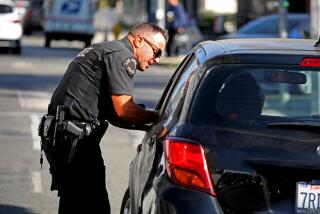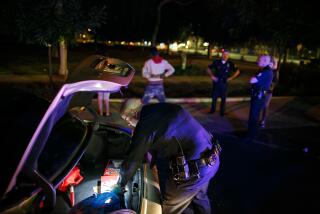Best Way to Fight It, American Bar Assn. Says : Drunk Driving: Make It Morally Wrong
- Share via
The best way of combating drunk driving is to persuade the public that the offense is as morally wrong as burglary, concluded the chairman of an American Bar Assn. committee which has reviewed law enforcement techniques across the country.
The yearlong study, the first of its kind by the legal profession, has been summarized in a report distributed to 1,500 state legislators, prosecutors, police and highway safety agencies.
“We just wanted to give people some real, practical tools to use, to show what things have been tried and what seems to be effective and what isn’t,” the panel chairman, Los Angeles Superior Court Judge David A. Horowitz, said in an interview last week.
Financed by $100,000 in grants from five organizations, including the Distilled Spirits Council of the United States, the study recommends a number of ways of curbing accidents caused by drunk drivers, such as setting the legal drinking age at 21.
But, in general, the panel found that no single law enforcement tactic presents a magic answer. Police departments cannot devote enough manpower to arrest all drunk drivers, Horowitz said, so people must learn to police themselves, as they do in most serious crimes.
Roadside Checkpoints
“The only way we can make a difference,” he said, “is to have the public attitude toward getting into a car when you are under the influence of alcohol or drugs be a bad thing to do--not socially acceptable--so that it becomes a moral stigma just like burglary.”
Horowitz said his committee concluded that programs such as police roadside checkpoints of all drivers’ sobriety reduce accidents caused by drunk drivers by increasing public awareness of the dangers of drunk driving. When the checkpoints become commonplace and receive no publicity, he said, public awareness plunges and the accident rates go back up.
He said citizen groups like Mothers Against Drunk Driving have helped to persuade the public that driving under the influence is morally wrong, but that more needs to be done.
Among the committee’s recommendations were that judges receive probation reports outlining the background of all first offenders and be given discretion about sentencing them, reserving mandatory jail sentences or fines for repeat offenders, and that offenders not be allowed to plead guilty to lesser, non-alcohol or drug-related offenses.
More to Read
Sign up for Essential California
The most important California stories and recommendations in your inbox every morning.
You may occasionally receive promotional content from the Los Angeles Times.













